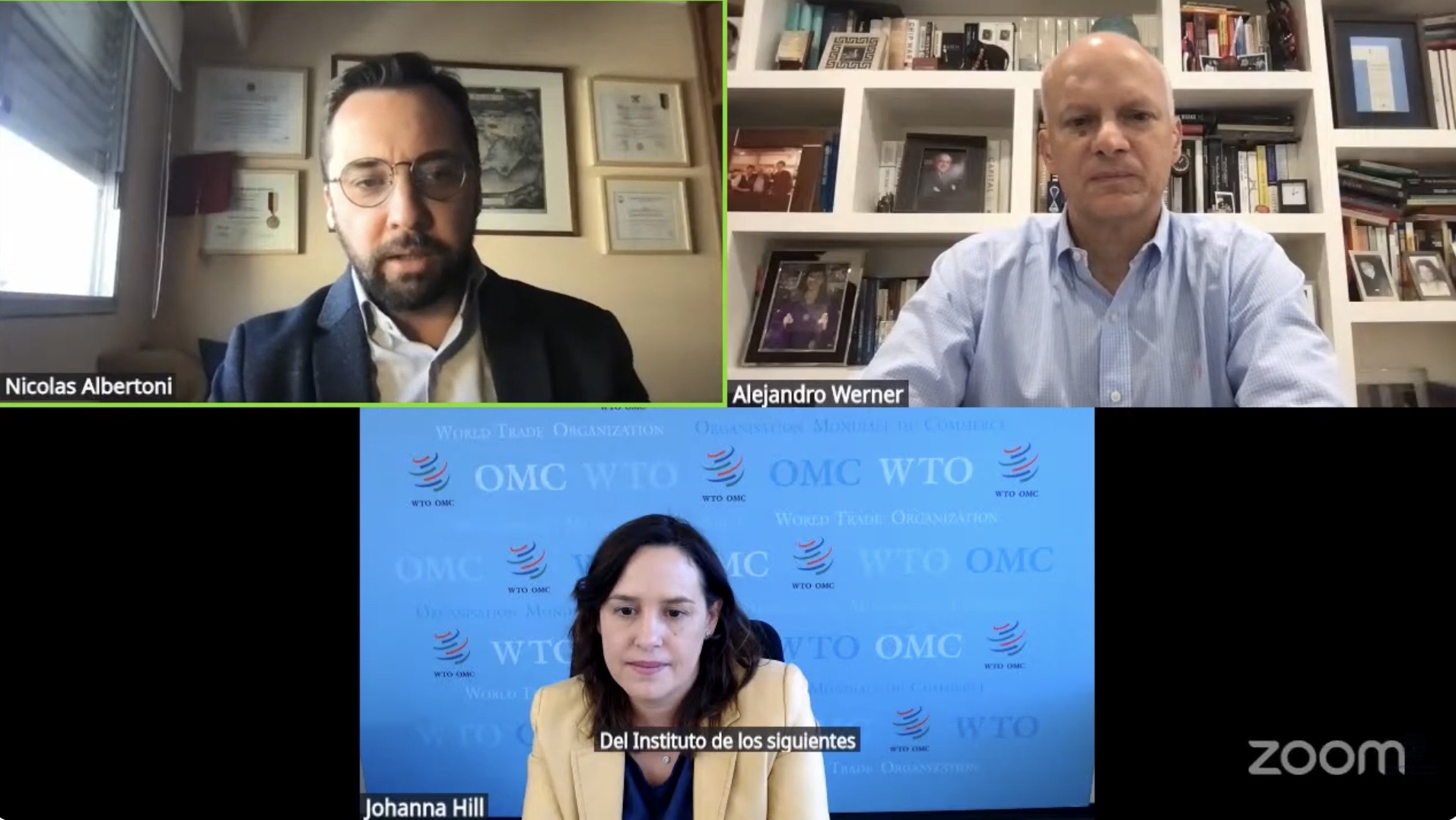Johanna Hill on Multilateralism and Latin America’s Role in the Global Trading System
On September 9, the Georgetown Americas Institute (GAI) launched GEO-LAC: Latin America in the New Geoeconomic Order, a new dialogue series exploring how Latin America and the Caribbean are navigating the shifting global landscape of trade, investment, and supply chains. Hosted by Nicolás Albertoni and Antoni Estevadeordal, GEO-LAC brings together leading policymakers, scholars, and practitioners to discuss the region’s place in a world marked by rising protectionism, technological disruption, and changing geopolitical alliances.

The inaugural session featured Johanna Hill, deputy director-general of the World Trade Organization (WTO), in conversation with Albertoni and Alejandro Werner, founding director of GAI. Hill reflected on the enduring importance of multilateralism in international trade governance, the ongoing reform agenda at the WTO, and Latin America’s role in shaping the future of global cooperation.
The Value of Predictability and the Role of the WTO
Hill noted that the global economy is currently defined by uncertainty and fragmentation, and that the absence of clear trade rules has tangible economic costs. For businesses, unpredictability—rather than tariffs themselves—has become the most burdensome obstacle to investment and growth. The multilateral trading system, she argued, offers a framework of stability that enables governments and private actors to plan for the long term, make informed decisions about where to produce, and invest with confidence.
Hill highlighted that WTO rules currently govern roughly 72% of world trade, covering the majority of goods and services that cross borders. Beyond its well-known negotiating function, the WTO also plays a crucial role in daily problem-solving through its councils and committees, where delegates discuss challenges, share lessons learned, and build consensus on emerging issues. This behind-the-scenes work, she said, keeps the “plumbing” of the global trading system functioning.
“The multilateral trading system brings to the table the stability needed for countries, economies, and businesses to plan for the long term.” – Johanna Hill
Protectionism, Plurilateralism, and the Modernization of Trade Governance
Hill explained that regional and plurilateral trade initiatives—agreements among subsets of WTO members—should not necessarily be seen as threats to the multilateral system but as complementary efforts that can eventually be integrated into its architecture. For instance, the WTO’s Agreement on Government Procurement is a plurilateral initiative that operates within the organization’s legal framework and includes a broad, though not universal, membership.
Furthermore, the multilateral system is evolving to address new challenges, including the digital economy, investment facilitation, and environmental sustainability. The WTO is currently exploring how plurilateral negotiations on topics such as e-commerce and investment for development can be incorporated into its broader institutional structure.
Ongoing Negotiations and the Road to the 14th Ministerial Conference
Looking ahead to the WTO’s 14th Ministerial Conference (MC14) in Cameroon in 2026, Hill outlined several areas where member states are seeking progress. Agriculture remains a central topic for Latin American and Caribbean nations, which have long advocated for fairer trade conditions and reduced subsidies in developed economies. She also cited continued work on fisheries subsidies, noting that a first phase of the agreement had been reached but further negotiations are needed to address outstanding issues.
Two of the most advanced areas of consensus are the Investment Facilitation for Development Agreement and the Joint Statement Initiative on E-commerce. The former, Hill explained, aims to promote transparency, streamline administrative procedures, and strengthen support for developing countries as they attract productive investment. Through partnerships with organizations like the Inter-American Development Bank, countries conduct diagnostic assessments to identify needs and receive technical assistance for implementation. The e-commerce initiative, meanwhile, seeks to modernize rules governing digital trade and ensure that developing economies can fully participate in the digital marketplace.
Middle Powers and Latin America’s Leadership in Trade Governance
Albertoni raised the question of leadership within the global trading system, referencing the WTO director-general’s recent comments in the Financial Times on the growing influence of “middle powers” such as Uruguay, Singapore, Australia, and New Zealand. Hill agreed that Latin America is well positioned to play a leading role in strengthening multilateralism. She pointed to examples of regional leadership, including Chile’s work on investment facilitation, Costa Rica’s efforts linking trade and environmental sustainability, and Guatemala’s leadership on small-economy issues. Such contributions demonstrate that the region is not only an active participant but also a source of innovation and initiative in trade policy.
Inclusive Trade and Future Challenges
Hill also discussed the importance of inclusive trade policies that ensure broader participation in the benefits of globalization. Drawing on recent WTO research, she explained that growing geopolitical tensions and technological changes have heightened public concern about the effects of trade on jobs and inequality. The challenge is to design national and international policies that both expand opportunities and help those left behind adjust to changing economic conditions.
Looking ahead, Hill said that the WTO’s 2024 World Trade Report will focus on artificial intelligence, trade, and inclusivity—an acknowledgment that technological disruption must be understood as part of the future of economic openness. The goal, she stressed, is to make trade a driver of equitable development rather than division.
Q&A: Sustainability, Digital Trade, and Regional Integration
During the Q&A session, Hill addressed audience questions on sustainable trade, digital regulation, and regional cooperation. She acknowledged that while the WTO has yet to develop a comprehensive framework on sustainability and green transition, several members are pushing to bring these issues into the mainstream of trade discussions. On digital trade, current agreements do not include rules of origin for digitally delivered services, a gap that future negotiations may need to address.
Hill closed by emphasizing the importance of strengthening regional integration in Latin America and deepening participation in global value chains. With the majority of world trade still governed by WTO rules, she argued that maintaining and modernizing the multilateral trading system remains essential for promoting stability, inclusivity, and shared prosperity.
